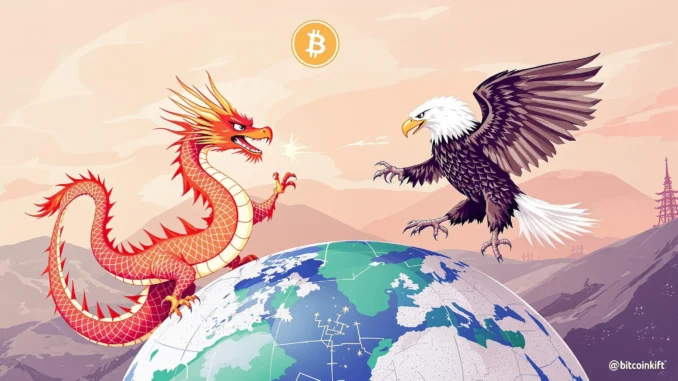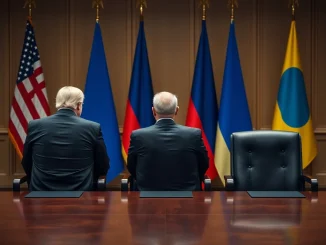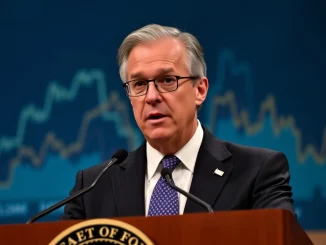
The global economic landscape is bracing for turbulence as China has firmly responded to the latest tariff salvo from former U.S. President Donald Trump. The simmering trade tensions are threatening to boil over, and the cryptocurrency market, often seen as a barometer of global economic sentiment, is watching closely. Let’s dive into the details of China’s assertive stance and what it could mean for the world and the digital asset space.
Why are China Tariffs Back in the Spotlight?
Just when the world seemed to be navigating a fragile path towards economic recovery, the specter of renewed trade friction has emerged. The announcement of additional tariffs by the former US President has reignited concerns about a full-blown trade war. But why now? Let’s break down the key factors:
- Political Posturing: Trade policy often becomes a tool in political maneuvering, both domestically and internationally. These tariffs could be interpreted as a strategic move with various political motivations.
- Economic Leverage: Tariffs are designed to exert economic pressure, aiming to protect domestic industries or to influence trade practices of other nations.
- Trade Imbalance Concerns: Underlying trade imbalances between major economies continue to be a point of contention, and tariffs are sometimes used as a measure to address these perceived imbalances.
The immediate trigger, as reported by Yonhap, is the imposition of an additional 10% tariff. While the specifics and scope of these tariffs need further clarification, China’s reaction signals a firm resolve to defend its economic interests. This isn’t just about numbers; it’s about the delicate balance of global trade and the potential ripple effects across various sectors, including the cryptocurrency market.
China’s Firm Response: What ‘Necessary Measures’ Could Entail?
China’s declaration to take “all necessary measures” is a strong statement, but what does it practically mean? While the exact nature of these measures remains to be seen, we can speculate on potential actions based on past responses and current geopolitical dynamics. Here are some possibilities:
- Retaliatory Tariffs: The most direct and expected response would be the imposition of tariffs on U.S. goods. This tit-for-tat approach has been a hallmark of previous trade disputes and could escalate quickly.
- Non-Tariff Barriers: Beyond tariffs, China could employ non-tariff barriers such as increased regulatory scrutiny, customs delays, or stricter quality controls on U.S. imports.
- Strategic Sector Actions: China might target specific strategic sectors important to the U.S. economy, potentially impacting key industries or supply chains.
- Diplomatic and Legal Challenges: China could pursue diplomatic channels and legal avenues through international organizations like the World Trade Organization (WTO) to challenge the tariffs.
- Currency Adjustments: While less direct, currency adjustments can also be used to influence trade competitiveness. However, this is a more complex and potentially destabilizing measure.
It’s crucial to understand that these measures are not isolated events. They are interconnected pieces in a larger geopolitical puzzle. The **economic impact** of these actions could be far-reaching, affecting global supply chains, inflation, and investor sentiment.
Impact on the Global Economy: Are We Heading Towards a Trade War?
The escalating tensions raise a critical question: Are we on the brink of another full-scale **trade war**? The implications of such a scenario are significant for the **global economy**. Let’s consider the potential fallout:
| Area of Impact | Potential Consequences |
|---|---|
| Global Trade Flows | Disruptions to established trade routes, reduced trade volumes, and increased costs for businesses and consumers. |
| Supply Chains | Breakdown of global supply chains, forcing companies to relocate production, diversify sourcing, and potentially face shortages. |
| Inflation | Increased tariffs translate to higher import costs, which can contribute to inflationary pressures across economies. |
| Economic Growth | Reduced trade and investment, coupled with uncertainty, can dampen economic growth prospects globally. |
| Market Volatility | Increased uncertainty and risk aversion can lead to heightened volatility in financial markets, including stock markets and potentially cryptocurrency markets. |
While the situation is fluid, the rhetoric and actions from both sides suggest a heightened risk of escalating trade tensions. The world is watching closely to see if diplomatic solutions can prevail or if we are headed towards a more protracted and damaging trade conflict.
Cryptocurrency Markets and Trade War Uncertainty: What’s the Connection?
You might be wondering, what does all this **China tariffs** and **trade war** talk have to do with cryptocurrencies? The connection is more profound than you might initially think. Here’s how global economic uncertainty, driven by trade tensions, can influence the crypto market:
- Safe Haven Asset Narrative: In times of economic turmoil, some investors view cryptocurrencies, particularly Bitcoin, as a safe haven asset, similar to gold. Increased uncertainty can drive demand for these assets.
- Risk-On/Risk-Off Sentiment: Cryptocurrency markets are often influenced by broader market sentiment. A risk-off environment, triggered by trade war fears, can lead to both sell-offs and potential flights to perceived safety within the crypto space.
- Global Liquidity Flows: Trade wars can impact global liquidity and capital flows. Changes in these flows can indirectly affect cryptocurrency markets, which are globally interconnected.
- Inflation Hedge Argument: If tariffs contribute to inflation, some investors might turn to cryptocurrencies as a hedge against inflationary pressures, given their limited supply in many cases.
- Geopolitical Uncertainty: Cryptocurrencies, with their decentralized nature, can be seen as less susceptible to traditional geopolitical risks. Increased geopolitical uncertainty might make them more attractive to some investors.
It’s important to note that the cryptocurrency market is complex and influenced by numerous factors. Trade war tensions are just one piece of the puzzle, but a potentially significant one given the current global economic climate.
Navigating the Trade War Storm: Actionable Insights
For cryptocurrency investors and enthusiasts, understanding the potential implications of these **Trump tariffs** and China’s response is crucial. Here are some actionable insights to consider:
- Stay Informed: Keep a close watch on developments in the trade dispute. Follow reputable news sources and economic analysis to stay updated.
- Diversify Your Portfolio: Diversification is always a prudent strategy, especially in times of uncertainty. Don’t put all your eggs in one basket.
- Manage Risk: Be mindful of market volatility. Consider using risk management tools and strategies to protect your investments.
- Long-Term Perspective: Remember that cryptocurrency markets are known for their volatility. Focus on the long-term potential of the technology and the market rather than short-term fluctuations driven by geopolitical events.
- Understand Market Sentiment: Pay attention to market sentiment and investor behavior. Trade war news can significantly impact market psychology.
Conclusion: A World on Edge – Will Trade Tensions Reshape the Future?
The resurgence of trade tensions between China and the U.S. is more than just an economic skirmish; it’s a critical juncture with the potential to reshape the global economic order. China’s firm vow to take “all necessary measures” underscores the seriousness of the situation. The implications for the **global economy** are considerable, ranging from disrupted trade flows and inflationary pressures to increased market volatility. For the cryptocurrency market, this renewed uncertainty adds another layer of complexity. While trade wars are undoubtedly concerning, they also highlight the potential role of decentralized and alternative assets in a world grappling with economic and geopolitical instability. As the situation unfolds, vigilance, informed decision-making, and a long-term perspective will be key to navigating these turbulent times. The world watches, waiting to see if diplomacy can de-escalate tensions or if we are indeed entering a new era of heightened trade conflict.



